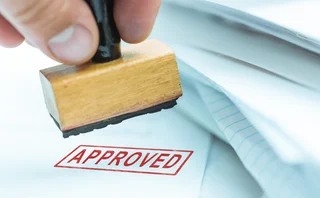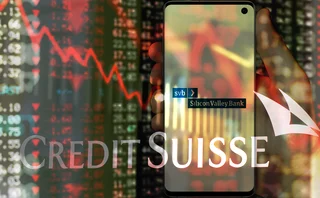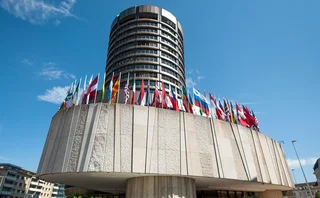
Enron charged with gas and broadband manipulation
The US Commodity Futures Trading Commission (CFTC) yesterday finally charged bankrupt energy trader Enron and a former company vice-president with manipulating natural gas prices. Also yesterday, federal authorities arrested on fraud charges two Enron officials who had worked in the company's bandwidth trading unit, the US Department of Justice (DOJ) said.
The CFTC alleged that on July 19, 2001, Shively, through EnronOnline (EOL), caused Enron to purchase an extraordinarily large amount of Henry Hub (HH) spot market natural gas within a short period of time, causing artificial prices in the HH spot market and affecting the correlated New York Mercantile Exchange natural gas futures price.
The complaint also charges Enron with operating EOL as an illegal futures exchange from September 2001 to December 2001. According to the complaint, in September 2001 Enron modified EOL to effectively allow outside users to post bids and offers. Enron listed at least three swaps on EOL that were commodity futures contracts.
The complaint further alleged that with this modification, Enron was required to register or designate EOL with the CFTC or notify the CFTC that EOL was exempt from registration. Enron failed to do either, meaning that, in effect, EOL became an illegal futures exchange.
Finally, the complaint charged Enron with offering an illegal agricultural futures contract on EOL. According to the complaint, between at least December 2000 and December 2001, Enron offered a US financial lumber swap on EOL. The complaint alleged the EOL lumber swap was an agricultural futures contract that was not traded on a designated exchange or otherwise exempt, and therefore was an illegal agricultural futures contract.
Separately, the DOJ said two Enron executives who were involved in the company's broadband enterprise face charges of securities fraud and wire fraud in connection with Enron's $111 million contract with video retailer Blockbuster.
Kevin Howard and Michael Krautz, who were executives for Enron Broadband Services, were charged with conspiracy and making false statements to US FBI agents, the DOJ said. Howard and Krautz "intentionally violated the accounting requirements" to allow Enron to record $111 million as revenue in 2000 and 2001, said the affidavit released by DOJ.
The Enron Broadband Division signed a 20-year contract with Blockbuster on April 5, 2000, to "stream" movies into its customers' homes. But EBS never generated any significant recurring revenue from its telecommunications business, the affidavit added.
Only users who have a paid subscription or are part of a corporate subscription are able to print or copy content.
To access these options, along with all other subscription benefits, please contact info@risk.net or view our subscription options here: http://subscriptions.risk.net/subscribe
You are currently unable to print this content. Please contact info@risk.net to find out more.
You are currently unable to copy this content. Please contact info@risk.net to find out more.
Copyright Infopro Digital Limited. All rights reserved.
You may share this content using our article tools. Printing this content is for the sole use of the Authorised User (named subscriber), as outlined in our terms and conditions - https://www.infopro-insight.com/terms-conditions/insight-subscriptions/
If you would like to purchase additional rights please email info@risk.net
Copyright Infopro Digital Limited. All rights reserved.
You may share this content using our article tools. Copying this content is for the sole use of the Authorised User (named subscriber), as outlined in our terms and conditions - https://www.infopro-insight.com/terms-conditions/insight-subscriptions/
If you would like to purchase additional rights please email info@risk.net
More on Regulation
FRTB start dates must align globally, says European Commission
Lawmaker could trigger delay to market risk rules in Europe if US implementation drags on
Fed green lights more capital relief trades
Five US banks authorised to issue repeat credit-linked notes backed by financial guarantees
Basel III endgame: why moving fast might prove better for banks
Republicans are pushing for reproposal, but a rapid finalisation may prove less far-reaching
Isda pushes to ‘decouple’ Simm calibration from model changes
Emir 3.0 prompts effort to separate risk-weight revisions from methodology updates
Basel war on window-dressing may smooth liquidity, at a price
Changes to G-Sib charge could curb year-end repo volatility, but also cut balance sheet capacity
One year on, regulators still want a cure for bank runs
Broad support for higher outflow assumptions on uninsured deposits, but that won’t save insolvent banks
Watchlist and adverse media monitoring solutions 2024: market update and vendor landscape
This Chartis report updates Watchlist monitoring solutions 2022 and focuses on solutions for sanctions (name and transaction) screening and monitoring adverse media and its related elements
Basel Committee reviewing design of liquidity ratios
Focus on LCR and NSFR after Silicon Valley Bank and Credit Suisse, but assumptions may not change
Most read
- Breaking out of the cells: banks’ long goodbye to spreadsheets
- Too soon to say good riddance to banks’ public enemy number one
- Industry calls for major rethink of Basel III rules







